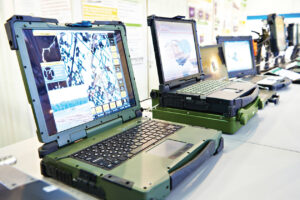FAQs About Rugged Computers
By: Maureen Paraventi

Rugged computers are waterproof and dustproof and can withstand shocks, strong vibrations, corrosion, temperature and humidity extremes, electromagnetic interference and excessive levels of noise and pressure. © Sergey Ryzhov – stock.adobe.com
Computers are essential to almost every workplace, but not all computers are built to withstand the conditions found in every workplace. Rugged laptops, tablets and even cell phones are becoming more and more popular for certain environments and applications. While the word “rugged” is very descriptive, it’s also a bit general. What, exactly makes a device rugged? Are rugged devices costly? Are there standards and/or certifications that can help buyers decide on the model or features that are best for them. Here are answers to some of the questions asked frequently about rugged computers and other devices.
What makes a rugged device rugged?
Rugged computers are engineered to survive and function in harsh conditions. They are waterproof and dustproof and can withstand shocks, strong vibrations, corrosion, temperature and humidity extremes, electromagnetic interference and excessive levels of noise and pressure. Being dropped, dented or otherwise damaged will not affect their operational ability.
Where are rugged devices found?
The military is a major user of rugged devices, and issued a standard in 1962 that establishes guidance and testing intended to replicate the effects of various environments on equipment – including rugged computers – used in military operations. (More on that below.) Rugged devices are also in widespread use in manufacturing, construction, the oil and gas industry, transportation, agriculture, retail, healthcare and outdoor recreation.
How are devices made rugged?
In addition to tough exterior housing, rugged computers have elements and design features that enable them to perform well in challenging environments. That may include liquid cooling and heat sinks, less cabling and electronic components manufactured to endure very high and very low temperatures.
Do I really need a rugged computer?
If you work indoors, in a clean, climate-controlled office, the answer is no. However, if your work-related tasks require you to use a computer in transit, out of doors, in hazardous environments, near forklifts or heavy machinery or in the vicinity of welding activities, a rugged computer may be a wise choice for you to make- especially if you store valuable data on the device. The increase in remote work means that IT pros may not be readily available if you need emergency data retrieval.
Are rugged devices worth the price?
Rugged units do cost more than conventional units. However, it is important to consider the relatively longer lifespan of such devices and the impact on productivity if a non-rugged devices becomes damaged and stops working. These factors may explain the results of a 2007 study that found the total cost of ownership for rugged notebooks was 36% lower than for non-rugged versions.1
Are there certifications or standards for rugged devices?
If you want to be sure you are getting an authentically rugged device, make sure it has two certifications:
- Military Standard (MIL-STD-810) (mentioned above). Devices that have earned this rating have been tested to make sure they meet the military’s standards for equipment that can function in challenging environments.
- An IP-rating that verifies water- and dust-proofing
It may also have ATEX certification, a European Union designation used to regulate equipment intended for use in potentially explosive atmospheres in the EU.
Rugged Options
Laptops – Although mobile, rugged laptops have thicker, stronger and heavier housing than conventional laptops. They can be used reliably outdoors and in wet and dusty conditions and will not be affected by shock, vibration or being dropped.
Tablets – These have a solid-state drive, no moving parts and typically, no fan, which makes them more dust- and water-resistant than rugged laptops. They are engineered to work in extreme temperatures and to avoid breakage due to vibrations, shocks and being dropped.
Smart phones – Because they are difficult to design and manufacture, there are few rugged smart phones on the market. The ones that are available are protected from dust, water, vibration and shock with a completely sealed housing.



